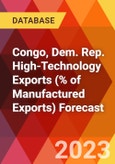High-technology exports are products with high R&D intensity, such as in aerospace, computers, pharmaceuticals, scientific instruments, and electrical machinery. The method for determining high-technology exports was developed by the Organisation for Economic Co-operation and Development in collaboration with Eurostat. It takes a "product approach" (rather than a "sectoral approach") based on R&D intensity (expenditure divided by total sales) for groups of products from Germany, Italy, Japan, the Netherlands, Sweden, and the United States.
Economic Indicators Forecasts are based primarily on World Bank historical data and global GDP and employment forecasts from sources such as Goldman Sachs, Conference Board, The Economist, and the International Monetary Fund. Country forecasts are based on 1) World Bank country GDP and employment forecasts, and 2) a consensus forecast on total global GDP from multiple economist sources.
Data from 2017-2022 is historical data, 2023-2025 are forecasts. Economic Indicators forecasts are based on the most current GDP and employment outlooks. These estimates are current (nominal) figures, not constant (real) figures. They do not account for unpredictable future declines (recessions, natural disasters, wars, etc.).
Economic Indicators Forecasts are based primarily on World Bank historical data and global GDP and employment forecasts from sources such as Goldman Sachs, Conference Board, The Economist, and the International Monetary Fund. Country forecasts are based on 1) World Bank country GDP and employment forecasts, and 2) a consensus forecast on total global GDP from multiple economist sources.








